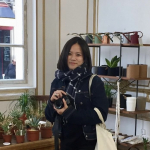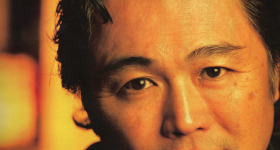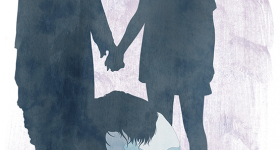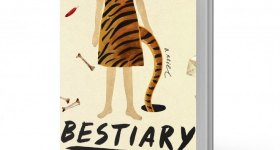Elizabeth Miki Brina’s memoir, Speak, Okinawa: A Memoir, delves into the complicated history of her parents — an Okinawan war bride and a Manhattan-raised Vietnam War veteran. Her story explores the direct effects of U.S. imperialist ventures on her parents’ relationship, her experiences growing up pulled between two worlds and how she’s begun to make sense of her family’s American history — in which so much had previously been left unsaid. Viviane Eng corresponded with Miki Brina about her literary inspirations, writing during the pandemic and her mission in writing the book. This interview has been edited for length and clarity.
Viviane Eng: As much as Speak, Okinawa is a memoir that delves into your complicated family history, it also serves as a deeply lyrical archive of 20th century Okinawa. Can you tell me about your research process and describe the moment in which you decided that you needed to write this book?
Elizabeth Miki Brina: The moment I decided I needed to write this book was shortly after my mother’s baptism. She had recently joined the Rochester Japanese Christian Congregation, and when I attended her baptism, I discovered that not only were all the 50 or so members Japanese, but almost all of them were women, almost all of the women were around my mother’s age and all of the women were married to white American men who had served in the military. This was the first time I realized that there are many people like my mother and that her marriage to my father couldn’t have been just a coincidence, an anomaly or an isolated incident. There had to be some common cause, some overlapping experience. Then I began to research our history, personal and individual, as well as the global events that took place in order for my mother and father to meet. I read several academic texts by scholars who were also trying to understand this social phenomenon: Women of Okinawa and Okinawa’s GI Brides, as well as Okinawa: The History of an Island People by George Kerr, a tome of 500 pages recounting the history of Okinawa from its first settlers to its total devastation during World War II. But the memoirs and short stories and novellas helped me the most. I could see and feel the history as it was lived. I could witness it. That’s what truly made me understand what my mother and people like her had endured, and subsequently, made me understand myself. And that’s what I wanted to be able to achieve in my book. I wanted the history to feel real and close.
VE: As I read through the book, I was continually struck by your capacity for empathy. Whether it was empathy for your parents, abusive partners or yourself, you always managed to cast a nuanced light on everyone who appears in your story. Do you think empathy has always been a strong suit of yours, or is it something that comes out through your writing process?
EMB: I think both. I was raised by two incredibly empathetic parents. They always tried to understand my behavior, my choices and motivations in context. They always gave me the benefit of the doubt. If I did anything cruel or insensitive, they seemed to understand that it came from a source of hurt and confusion. Taking these cues from them, I always tried to reciprocate their empathy and transfer this empathy to other people in my life. I think writing is a natural and immediate way to practice and display empathy. I write to understand myself, and in order to fully understand myself, I have to understand the people who have impacted me. It wouldn’t do me any good to be one-sided, to disregard their humanity and everything that happened to them to make them do what they do. Writing gives me a chance to express my interpretations and inferences. Usually, off the page, when we’re in the heat of the moment, on the spot, or too young and unaware and careless and selfish, we don’t get to share our explanation.
VE: Throughout the book, your narrative voice jumps between scenes of World War II-era Okinawa and your own life growing up in upstate New York. Readers are offered interior glimpses into the lives of people you didn’t know personally, such as the wounded mother nursing her baby for the last time during the infamously brutal Battle of Okinawa. So many images that stuck with me from the book are from your descriptions of scenes you certainly did not witness firsthand — they read as if they’re from a novel. What’s the line between fiction and nonfiction for you? Did you ever think about telling this story as a work of fiction? How do you bring something that you didn’t experience firsthand to life, especially within the form of a memoir, a genre that supposedly prioritizes “true” stories?
EMB: I must admit that I’ve been grappling with this line between fiction and nonfiction for as long as I’ve been writing. I believe it’s inaccurate to simply define the line as the difference between fabrication and fact, whether you’re contriving and imagining or reporting and remembering. I believe nonfiction as memoir has more to do with the decision to claim the narrative as yours, as having actually happened to you, and this decision is based on what will better serve the work, what will allow you to tell the complete story, convey the complete emotional truth, as much of it as possible. I never considered writing my story as fiction. I couldn’t. I absolutely had to tell it as me, as mine. Those horrific events didn’t actually happen to me, but they actually happened to real people, and those real people are my ancestors. I believe their lives — what they suffered — has too much to do with me and my life to deny it or distance myself from it.
VE: Speak, Okinawa often makes a point of discussing the notion of inherited traumas and how our past experiences cause us to behave in the idiosyncratic ways that we do, for better or for worse. In the case of your parents, in particular, I find that you paint an incredibly honest portrait of both of them, where their virtues and flaws shine beside one another. Did you have to prepare your parents for how they were going to be depicted in the book? Do you worry about how they’ll react to the way they’ve been characterized?
EMB: These are the questions that keep me up at night or wake me up in the middle of the night. I’ve apologized to my parents many times in advance and mentioned to them that there are many of their “deep dark secrets” in the book that they probably don’t want anyone to know about. I asked them if they wanted to read the book before it was published and they declined. They say they trust me — Bless them! — and will wait until it’s officially on the shelves. So yes. Of course I worry. I don’t think it’s possible to ever fully capture a human being in all their complexities and nuances. Some gets left out, and perhaps the rest gets altered by what was left out. But like I said before, my parents are very understanding. I hope, once again, they will try to understand my choices and motivations. I’m sure they will. We’ll have a lot to talk about after they read it.
VE: Something I was impressed with throughout the book was your seemingly limitless access to your own memories, some of which went all the way back to your early childhood. Did you keep a journal growing up? How did you tap into the really old memories and ensure they still read as vivid and fresh on the page?
EMB: I did keep a journal growing up. I have about a dozen Five Star spiral-bound notebooks from middle school and high school stashed away in my parents’ attic. I didn’t reread those, by the way (couldn’t bring myself do it!), though I think the mere act of writing helped solidify these memories and what I was feeling. I also think that certain memories, the ones that are especially crucial, the ones that need to be examined, remain intact for this reason. That was part of the process for writing this book: focusing on the memories that had always stood out to me, came back to me over and over again and stayed with me after so many years, then trying to understand why. And although craft-wise it’s often considered gimmicky, writing in the present tense really helped put me back in those moments.
VE: Were there any findings or realizations in your research and writing that you wish you hadn’t encountered? How did you decompress after working on sections of the book that took a particularly heavy emotional toll on you?
EMB: If it was true, then no, I don’t wish I hadn’t encountered it. But I wish a lot of it didn’t happen, especially what’s happening to Okinawa now, the new bases that are currently being constructed. What a heartbreak and injustice for the majority of Okinawans who want all the bases to be removed. I wish I had healthier forms of decompression but usually I drink several tall glasses of red wine spritzers or just red wine, depending on the temperature and mood of the night, chain smoke cigarettes and listen to music on my headphones on my porch. And cry. But before I write, I usually go for a bike ride or a walk so maybe that cancels out the bad-for-me stuff?
VE: What has been your experience of preparing to release your debut work in the midst of a global pandemic? What changes to your publication plan have you had to make as a result?
EMB: I certainly had dreams and visions of releasing my debut work under different circumstances. I very much wish I could interact with other writers and readers in person, that I could celebrate in person with family and friends and the team of people who have been supporting me throughout the process. But looking back, I’m also extremely grateful the book is coming out now. With the last stages of revising and editing and getting ready for the launch, I feel fortunate that I had something so important to me to pour my anxious energy into, keep me grounded and focused during all this scary strangeness.
VE: Speaking as a fellow Asian American, I didn’t read books by anyone that looked remotely like me until I was probably in college. Ethnic studies and Asian American literature classes, frankly, changed my life! Whether it’s a specific title or a general topic, what from Asian American history or literature do you wish you were taught in high school?
EMB: I didn’t read a book by an Asian American author until graduate school and it changed my life, too! The first book I read by an Asian American author was The Woman Warrior by Maxine Hong Kingston and it is still one of my favorite books. I wish I could have read that book in high school, and the book The Buddha in the Attic by Julie Otsuka, and so many others. Also, Hiroshima by John Hersey, even though he wasn’t Asian American. It would have been extremely beneficial, if in general, Asian history or Asian American history was taught from the perspective of Asians or Asian Americans and not just Americans or white Americans.
VE: Who are some writers you’re especially excited by right now?
EMB: Like everyone else I know, I have a large stack of books to read and I always feel so far behind. I read very slowly and deliberately, so I only manage to read about 10 books a year if I’m lucky. The last five books I read were The Road by Cormac McCarthy, The Yellow House by Sarah Broom, The Big Door Prize by M.O. Walsh, Memorial by Bryan Washington and Memorial Drive by Natasha Trethewey. All of these books gripped me from beginning to end and were exactly what I needed to read at the time. Got me through 2020.










Comments